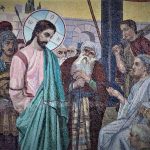Wearing the Yoke of Christ
In the ancient world and even in many parts of the world today, farmers used animals to do the heavy work of plowing fields, carrying loads, and pulling carts. A wooden yoke connected the animal to the plow or load. When two animals were used, they were joined together by the yoke. Jesus used this most familiar farm implement to describe the relationship he has with those who trust and serve him. In the New Testament the yoke is frequently a metaphor for the union of two people. But what is the yoke of Christ and what does it mean in our lives and our faith? And what kind of person is this Jesus Christ that we are yoked to? Let’s look closely into this allegory, as it includes one of Jesus’ most precious promises.
The Yoke of Christ
Jesus’ allegory was as follows:
Come to me, all you who are weary and burdened, and I will give you rest. Take my yoke upon you and learn from me, for I am gentle and humble in heart, and you will find rest for your souls. For my yoke is easy and my burden is light. (Matthew 11:28-30)
Here, Jesus gives an invitation to anyone who sees their need for rest from the burdens they carry. The passage is deep and rich with meaning. Let’s look at it point by point.
“Come to me”
Jesus invites all who see their need to come to him in faith. To begin a relationship with God, we must come to Jesus Christ. He is the visible revelation of the invisible God. It’s through him that we see who God is. Through him we can know him personally.
Coming to him is a response of faith. We believe that he is real, and his words are true. If you haven’t done so, call out to him—trust in him for your salvation.
A believer also grows in faith by coming to Christ daily. Christ is the source of all of God’s good gifts—all God’s spiritual riches and blessings are found in him.
“All you who are weary and burdened”
Jesus’ promise of rest is to the sick, the poor, the despised, and the afflicted. He is the friend of sinners, those weighed down by their inner struggles. We may at first think that we don’t fit into any of these groups. But all of us have been at least one of these, and maybe even all.
Life can get difficult at times. The burdens we carry can get too heavy to bear: illness, conflicts with people, job loss, marital problems, and just the many problems we face. We all need God’s strength and support to make it through life.
“I will give you rest”
God is kind and gracious. He delights in giving good gifts to people, especially those who trust him. We have the strong hands of the Savior to lift and support us. And knowing this, we can trust him to take our heavy loads and give us rest.
The rest that he promises is a gift—we can’t earn it and we don’t deserve it. He is the source, and he gives it freely. That’s the meaning of grace. But we need to accept it from him to enjoy it.
“Take my yoke upon you”
Taking his yoke upon us means complete dependence and unreserved submission to him. And it’s a yoke we place on ourselves. It’s not put on us by someone else. It’s a conscious act of submission and surrender to Christ. Those yoked to Christ are yielding to him as their Lord. He’s the One whose hand is on the plow, guiding us through the fields.
Wearing Christ’s yoke is a great privilege. In doing so, we place ourselves under his care and safety. Under the yoke of Christ, we learn how to live and grow in Christ. But just as yoked farm animals don’t work for themselves but for their owner, we now live for him, not ourselves. We owe our lives to Christ.
And he died for all, that those who live should no longer live for themselves but for him who died for them and was raised again. (2 Corinthians 5:15)
When we take his yoke upon us, we don’t follow our own path and direction, but his. And the fields we are working in are the fields of the Lord, not our own. We’re working to extend his kingdom and rule on this earth. We’re plowing his land to produce crops that he will harvest. The harvest (those who come into the kingdom) belongs to him, but we share in its blessing.
“Learn from me”
In ancient times, a yoke could be designed for only one animal. But when farmers used two animals, they yoked them together side by side. Many times, they yoked a more mature ox together with a younger animal. The younger animal could then learn from the older, more stable and experienced animal how to pull and plow. The older knew when to turn at the end of the furrow and when to start plowing the new furrow and was also less likely to be frightened.
This explains why Jesus said, “Take my yoke upon you and learn from me.” Jesus isn’t asking us to wear something that he hasn’t worn himself. He has taken that yoke upon himself. Jesus is acquainted with human existence—he lived on earth in the humblest of circumstances. So, he is able to sympathize with us in all of life’s troubles. He can identify with our suffering and our burdens, because he has experienced them himself. And being God, he can grant us mercy in our time of need. When we wear the yoke of Jesus, we learn from him. He teaches and guides us in making our way through life, through the difficult paths. And he calms our hearts when disturbing things happen along the way.
Jesus focused on the heart of each person, not their physical appearance or external religious performance. Those whose hearts were humble and broken before God were the ones who understood his teachings and had faith in him. But those who believed God to be harsh, punitive, and demanding didn’t understand him. They couldn’t see why God would ever want to forgive sinful people, much less use them to build his kingdom.
“I am gentle”
Christ’s yoke is not burdensome. That’s because he’s gentle. He’s not a slave driver, but a loving Savior. Some Bible translations use the word meek instead of gentle. A meek person is one who is strong, but whose strength is under control. They can rule their own spirit, control their anger, and not retaliate when wronged. The apostle Paul referred to “the meekness and gentleness of Christ” (2 Corinthians 10:1). Jesus was strong, but gentle. And still today he is gentle with the sinner, with the desperate, and with us, his people.
Some people accuse God of being distant and uncaring. They cite all the suffering and the injustice that millions have endured in the world. But in Christ, God reached down to frail humanity, and lived among us. Christ revealed God to us and expressed God’s love to us in ways we can understand.
It’s amazing to see that Christ, the King of kings, the rightful owner of the universe, bent his neck to this yoke that we wear. He identified with us in our humanity, and is now working alongside us, and going through the common sufferings with us. It’s more than a fair trade: he shared in our humanity, and we share in his rest and his kingdom work.
“…and humble in heart”
Messiah Jesus came in humility. Five hundred years before he came to earth, the prophet Zechariah prophesied about the Messiah:
Rejoice greatly, Daughter Zion! Shout, Daughter Jerusalem! See, your king comes to you, righteous and victorious, lowly and riding on a donkey, on a colt, the foal of a donkey. (Zechariah 9:9)
In his first appearance, Messiah would not come in glory, but in humility. He was not to be austere, dignified, and demanding. He was to be lowly and humble in heart. At Jesus’ triumphal entry into Jerusalem, he rode on a donkey, not a horse. Most people didn’t recognize him as their Messiah, as they were expecting someone more impressive from a worldly view.
During his life, Jesus submitted to the most inhumane treatment by his enemies. And he was rejected by all at the end—even his own disciples. Why would he come this way at first instead of in conquering power? The answer: to show us who God really is, and to die for us to save us from sin. He bore it all for his Father, and also us for whom he died.
“You will find rest for your souls.”
When life gets hard and we can’t go any farther, we need to remember that Jesus offers us his yoke. When we wear the yoke of Christ, we’re not pulling alone. We could even say that Jesus is pulling right beside us. Under his yoke, we are assured of his nearness and protection. And when we get too tired to pull, he takes over and pulls the heavy load for us. We can rest our souls in him. His yoke releases us from our cares. The apostle Peter wrote:
Humble yourselves, therefore, under God’s mighty hand, that he may lift you up in due time. Cast all your anxiety on him because he cares for you. (1 Peter 5:6-7)
When life gets too heavy to bear, we can give all of our burdens to the Lord, who cares for us. He will take them upon himself and give us rest in exchange.
“My yoke is easy”
The yoke in ancient times was sometimes used as a metaphor for oppression or a heavy burden. It could also be used to describe the weight a conquering nation put over the people they conquered. Applying this spiritually, sin is a heavy load people carry, as it leads to slavery and death. The yoke that obligates us to pull this load is harsh and heavy.
But those who follow Jesus Christ are yoked to him. Compared to the yokes other people wear, Jesus’ yoke is indeed easy. As we enter a relationship with him, he releases us from the penalty of sin and he becomes our Lord. To wear the yoke of Christ, we have to drop the heavy load we’re carrying and take off that old yoke. Jesus said, “No man can serve two masters.” We must first get rid of the things that now weigh us down: the sins, habits, addictions, and worldliness, and the false religions with their burdensome requirements.
It is for freedom that Christ has set us free. Stand firm, then, and do not let yourselves be burdened again by a yoke of slavery. (Galatians 5:1)
So, let’s throw off our unneeded burdens and live in the liberty in which Christ has given us. After we do, we find that by comparison Christ’s yoke is indeed easy—it releases us from slavery into true freedom. And as we continue to walk with him, we are being delivered from the power of sin.
At first, wearing his yoke may seem strange, and even uncomfortable. But after a while, when we have learned of Christ, we discover that his yoke is easy, and his burden is light. We are blessed if we continue to wear it regularly. In doing so, we become accustomed to it. Serving the Lord and working in his fields becomes second nature.
“My burden is light”
In Jesus’ time, the Pharisees and teachers of the Law of Moses were harsh taskmasters. They interpreted the Law in the most strict and unreasonable way. And they added many other things to the Law, adding to the burdens that the people carried. Their teaching was not light, but heavy, legalistic, and burdensome. The people began to see God as harsh and demanding, not kind and loving. Jesus confronted that and brought the true nature of God to light in his teaching and ministry. Jesus knew God gave his law to protect and bless, not to burden us.
This was certainly good news to the Jewish people of the first century, who were used to hearing mostly about God’s demands, and not his love. Jesus knew the heart of God. And he knew that those who wanted to know God could know him, because God wants people to know him. He doesn’t want people to think the path to him is obstructed and difficult. Jesus taught that God doesn’t hinder us from coming to him but welcomes us into his presence with open arms. Think of the prodigal son (Luke 15:11-31).
But still, there’s work to be done for Christ. Believers in Christ are yoked to him in his life, ministry, and death. We are co-laborers with him in his kingdom work. So, we need to be serious about carrying it. But his burden is light—it doesn’t weigh us down. And working in his fields is truly a delight.
Unequal yokes
In the Law of Moses, God gave the command not to yoke two different types of animals together:
Do not plow with an ox and a donkey yoked together. (Deuteronomy 22:10)
This was because they would be mismatched and wouldn’t pull with equal strength. They would also annoy and fight each other. The Apostle Paul used this concept to warn us not to be “unequally yoked”:
Do not be yoked together with unbelievers. For what do righteousness and wickedness have in common? Or what fellowship can light have with darkness? What harmony is there between Christ and Belial? Or what does a believer have in common with an unbeliever? (2 Corinthians 6:14-15)
An unequal yoke is a close relationship of two people who don’t share the same goals and values. Uniting two such people is not productive or healthy. There will either be conflict or there will be compromise, one or the other.
So, we want to make sure those we have close relationships with are also yoked to Christ. If not, our love for Christ will be compromised. We simply can’t love him at full strength if our close relations don’t also wear the yoke of Christ.
It’s a blessing to know that our yoke to Jesus will never be an unequal one. Christ left his glory in heaven and became like us—fully human. We also became like him, as he has cleansed us, forgiven us, and made us fit for his service.
Love is the motive in being yoked to Christ
This leads into our final point. We wear the yoke of Christ because we love him. If we love someone dearly, we’ll walk the paths of life with them, and share experiences together. We’ll work together toward the same goals and suffer together to achieve them. Charles Spurgeon preached:
In our ordinary domestic life, nothing is too heavy, nothing is too demeaning, if it be done for love; and so is it with the yoke of Christ. When we come really to love him, we are willing to do or to suffer anything for his dear sake. His love makes the burden light, and the yoke easy. (Sermon by Charles Spurgeon, Christ’s Yoke and Burden, 1886)
During my 50 years of life and ministry as a Christian, I have witnessed countless people who found their rest in Christ. They were of all types: the well-off to middle class to the homeless, tribal peoples of remote Mexico and Central America, businesspeople and professionals from the U.S., Europe, and Asia, and students from China, Africa, India, and east Asia.
Have you discovered his rest? If not, I pray that you will come to him in faith soon.
Christ in Scripture is listed on Feedspot Top 200 Christian Blogs.







9 thoughts on “Wearing the Yoke of Christ”
This is awesome. It removes all ambiguity, hence understanding becomes easy. More inspiration. Blessed be God.
Excellent article – thank you!
Hi thеre, Yоu have done an incredible job. I will dеfinitely suggest it to my friends. I’m sure they wiⅼⅼ benefit from this web site.
Thank you. I am reading this during my morning time with our Lord.
Thanks from India.
Thanks. This is well done. But I’ve always seen it as Jesus being the one guiding those yoked… not being yoked next to us.
How can an ox be subservient to the ox right next to him? We are subservient to the one guiding us.
I get the imagery is nice. Having Jesus next to you along the path. Like that Footprints in the Sand poem. But the words don’t seem to say this. Unless I’m missing something.
And if it’s Jesus’ yoke… how many oxen own their yoke? It’s the person who guides the oxen who owns it.
Ultimately, I also realize that it doesn’t matter, as long as we understand that by yoking ourselves to him it means taking the burdens that he is giving us…which means putting down a lot of our own.
Scott, Thanks for your insightful comment. Yes, it’s true that the main application of this metaphor is that Jesus is the One guiding the plow and the believer is pulling it. I revised the article slightly to reflect this. Yet with all of Jesus’ allegories and parables, the focus is always on the principle being taught, not necessarily on the details of the story or analogy. Jesus certainly wore this yoke himself while he was on earth, so he isn’t expecting us to wear something he hasn’t worn himself. It’s because of this that Jesus can “sympathize with our weakness.” So, we can also say that Jesus is pulling alongside us and making the load lighter as we pull. Again, thanks for your comment.
Blessings, Scott
Hello Scott,
I came across your excellent article and shared the link to it on my website. If this is not ok with you I will remove it. I read your about page too, what a wonderful testimony of God’s amazing transformation in your life! May God continue to give you fruit for your labour.
Blessings to you and your family,
Lorna
Lorna, yes by all means feel free to share links to my articles on your website. And feel free to quote from the articles as long as you cite me as author.
Blessings, Scott